
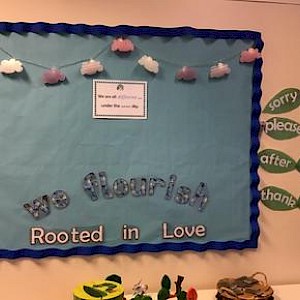

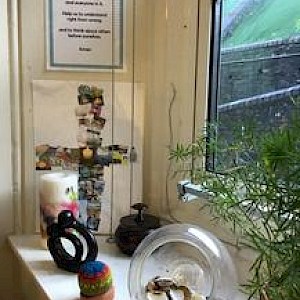


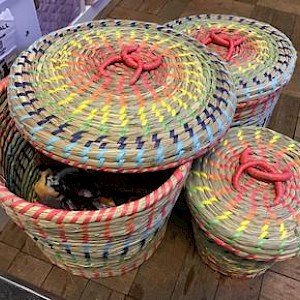
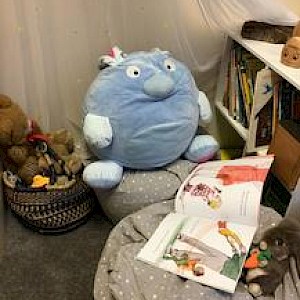
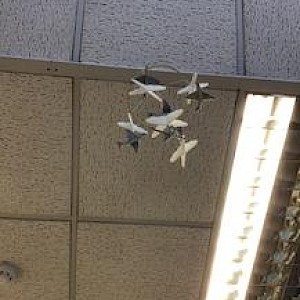



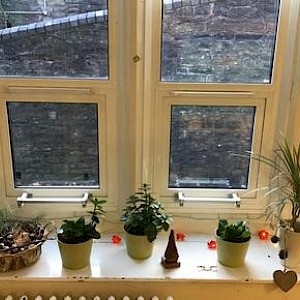













The school’s overarching aim is to encourage and nourish pupils’ intellectual, creative, spiritual and physical achievements in order that every child reaches their full potential.
At St Mary Redcliffe CE Primary School (SMRP) we are committed to providing a full and efficient education to all pupils and embrace the concept of equal opportunities for all.
We will endeavour to provide with the resources available to us an environment where all pupils feel valued and welcome.
If a child is identified as having special educational needs and/ or disabilities either by the school or by outside professionals, we will discuss with parents and carers the additional support and strategies that will be provided. The views, wishes and feelings of the child and their parents or carers are vitally important and we really want you to be as fully involved as possible.
Our staff work hard as a team to try and make school the best experience possible for children of all needs and abilities. If you have concerns about your child’s learning or progress, please make an appointment with their class teacher to discuss your concerns.
Sometimes parents/carers or school staff may feel it would be helpful to refer a child to another professional such as a Speech and Language Therapist. This is always done after discussion and only with parent/carers consent.
Senco and Inclusion
Lead- Liz Radnor
Nurture and Inclusion
Lead- Ruth Knights
Both can be contacted via the school office on admin.smrp@dbat.org.uk
We often hold events for parents and carers such as coffee mornings with the school nurse on a range of topics such as anxiety, healthy lifestyles including sleep difficulties. Last year we also had events run by Bristol Parent Carers www.bristolparentcarers.org.uk and the FLORA team flora@bristol.gov.uk.
Both of these organisations offer lots of advice on specific questions about your child’s SEND and where to get support. These events are open to all members of the school community and are valuable opportunities to find out information, meet other parents and carers and ask questions. Events are listed in the school weekly newsletter. Please do come along if you can.
All councils must publish a Local Offer. The Local Offer must inform you what support is available for families of children and young people with special educational needs or disabilities (SEND) and what services are available across education, health and social care. Please follow this link for further information.
Huge thanks to our wonderful PTFA for their generous donation to help resource this learning space.
In a school context, Nurture is about the social environment you are in - Who you are WITH, rather than Who you are born to.
The social environment influences social and emotional skills, wellbeing and behaviour. In SMRP School, Nurture supports children who have experienced missing or distorted early attachments. Strong, early attachments are the bedrock of how future relationships are formed.
1 Children's learning is understood developmentally
Start with where the child is, not where the adult thinks they should be. We have an accepting attitude towards all children whatever their age and stage of development. We celebrate progress from every individual starting point.
2 The classroom offers a safe base
Organising the classroom space and the way it is managed, helps children contain anxiety.
Strong yet flexible daily routines, a specific place for personal items, understanding how the day unfolds through visual timetable or cues, trusting relationships between adults and children all help to establish the idea "I belong, I am safe here."
3 Nurture is important for the development of wellbeing
A significant part of Nurture is listening - really listening, and responding.
Children need to be noticed and acknowledged both for effort and achievement. Noticing can be by using words (eg "That was hard for you, thank you for persevering") or by eye contact and smile, or an agreed appropriate hand signal. Nurture can be as simple as paying full attention, playing a game together, spending time in a child-chosen topic of conversation, not hurrying interactions.
4 Language is understood as a vital means of communication
Language is a way of putting words to feelings and emotions.
At SMRP School, we teach children greetings with our Wonderful Welcome, words to name emotions, turn-taking in conversations, respecting another person's point of view, how to disagree politely. Our curriculum teaches the acquisition of vocabulary. Words bring thoughts to life.
5 All Behaviour is Communication
When adults understand that children's behaviour is a way of communicating their feelings, adults respond differently to challenging behaviour.
We ask ourselves "What is this child trying to tell me?" We respond with Acceptance of where they are, and Empathy - "I'm sorry this is hard for you. I wonder what's happening for you?" "I can help you."
When the child senses that they are understood, then they can begin to move beyond the current difficulty. The adult makes the link between the child's internal and external worlds.
6 Transitions are significant in the lives of children
Transition is a process, not an event.
During the school day there are many transitions! Coming to school from home, going out to play, moving between the different spaces around our school. Then there are the big transitions - changing year group, leaving primary school, and managing change in family life. Familiar School Adults help children to manage changes in school routine or to work with a different adult. The key is good preparation and support.
Terms in the Statement:
SDQ - Strengths and Difficulties Questionnaire. A set of statements which can describe a pupil's behaviour. These help staff to consider what the needs are and how to meet them.
Boxall Profile - a resource to support staff in working out where social, emotional and behavioural needs are, in a class of pupils. The Boxall Profile gives strategies for simple and effective interventions as part of the learning environment: eg give a child an extra few minutes of uninterrupted attention to check in with them, or schedule whole class moments to pay attention to feelings and teach self-regulation strategies or learn how to have brain-breaks, or practise deep breathing.
The Boxall Profile Manual p14 says:
Children and young people lacking early nurturing experiences commonly exhibit challenging behaviours such as acting out or social withdrawal that prevent them from successfully engaging with teachers and peers, often leading to failures in learning.
The Boxall Profile provides entry points into the child's world, allowing teachers to think about what lies behind the difficult behaviour and understand what the child's real needs might be. Once missing skills are identified, staff can put in place targeted and individualised interventions to help the child or young person develop the skills they are lacking.
If you require paper copies of any information from the website please contact the school office.
To contact us please telephone the school office on 0117 353 4760 between 8:00 - 16:30 or send us an email.
SENCO and Inclusion Lead - Liz Radnor
LizRadnor.SMRP@dbat.org.uk
Chair of the Academy Council - Anthony Couzens
AnthonyCouzens.SMRP@dbat.org.uk
The Diocese of Bristol Academies Trust. Company No. 08156759
First Floor Hillside House, 1500 Parkway North, Stoke Gifford, Bristol, BS34 8YU
Sorry there is no parking at school on Windmill Close. Please park safely on local roads; Whitehouse Street and other near by roads are for permit holders only.
Parking around Victoria Park is best; it is only a quick walk through the park to the front of school.
Copyright St Mary Redcliffe Church of England Primary School © 2024 - Website by Warp Design & Thinking Creative